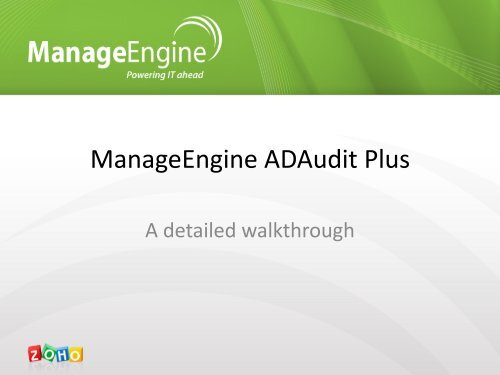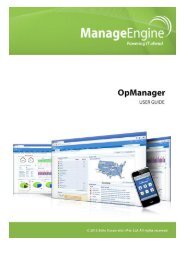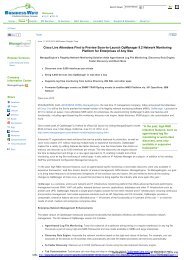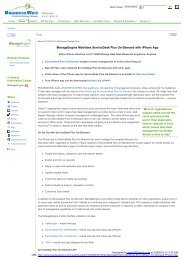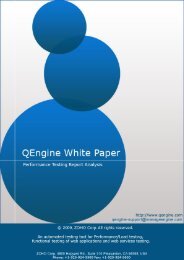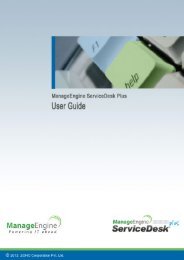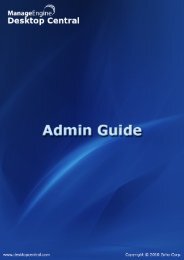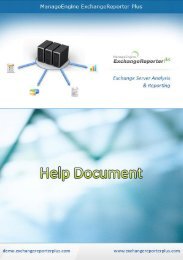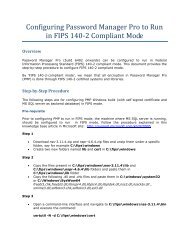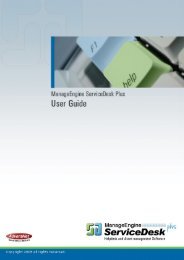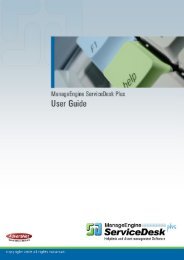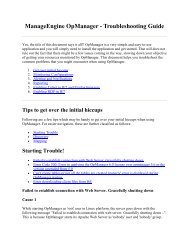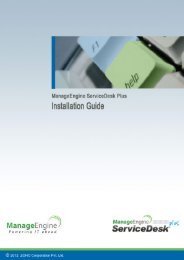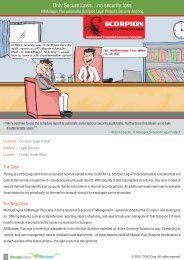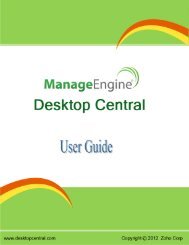Manageengine adaudit plus
Manageengine adaudit plus
Manageengine adaudit plus
Create successful ePaper yourself
Turn your PDF publications into a flip-book with our unique Google optimized e-Paper software.
ManageEngine ADAudit Plus<br />
A detailed walkthrough
Agenda<br />
• ManageEngine ADAudit Plus is a web based Active Directory change Audit<br />
and Reporting software.<br />
• It helps audit and track all changes in the Active Directory.<br />
• Active Directory changes on Users, Computers, Groups, GPOs, Ous,<br />
Domain Policies and logon activities are audited and reported from a<br />
central web console.
ADAudit Plus functioning
Tabs in ADAudit Plus
Home Tab of ADAudit Plus
Dashboard / Home Tab of ADAudit Plus<br />
• The Home Tab of ADAudit Plus provides a high-level picture<br />
with snapshots highlighting important Active Directory audit<br />
events like.<br />
1. A graph on the Logon Failure counts in the past 7 / 30 days.<br />
2. A pie-chart highlighting the error-codes when users logon has failed.<br />
3. The count of account locked-out users in the past week / month on<br />
a day to day basis.<br />
4. A single bar chart highlighting password changed / set users on a<br />
day-to-day basis for the last 7 / 30 days. (Selectable)
Dashboard / Home Tab of ADAudit Plus<br />
• Other Dashboard charts / graphs<br />
1. Peak Logon hour of a day with the average logon count for every<br />
hour.<br />
2. Account (user, computer and group) management actions like<br />
created, deleted and modified all available on a single graphical<br />
interface.<br />
The charts can be clicked to get a list view of desired change data.<br />
Further the graphs are selectable.<br />
The Dashboard provides the above highlighted info for all configured<br />
Domain controllers.
The Home page provides a<br />
snapshot of important change<br />
actions for all Domains<br />
configured on a single screen.<br />
Dashboard view of ADAudit Plus<br />
Use the refresh Icon to<br />
get updated information<br />
Click on any of the<br />
chart to view a list of<br />
its underlying details<br />
A 30 day or 7 day<br />
information can be<br />
interchably selected and<br />
viewed
ADAudit Plus Reports Tab<br />
Also explained configuration of Reports
ADAudit Plus Reports
Default Report Profile Categories
User Logon Report Category<br />
• The reports under this category provide general logon information of<br />
users.<br />
• Information like logon failures, logon attempts on various resources like<br />
workstations, member servers are reported and also graphically<br />
highlighted.<br />
• Click on the charts above the list to view filtered information.<br />
• Use the add/ remove columns link to add/remove the column of interest.<br />
• The reports can be exported to xls, csv, csvde, pdf and html formats.<br />
• It can be scheduled and configured to email notified to one or more<br />
domain users.
User Logon Report Category
Logon Failure Report<br />
• The logon failure report is a default report under the User Logon Reports<br />
category.<br />
• ADAudit Plus collects information on all the logon failures in the selected<br />
domain and lists them in a single report.<br />
• A pie-chart highlighted above the list provides a snapshot on all failure<br />
reasons.<br />
• The following report highlights the logon failure of all users in the domain<br />
“child.admp.com” in the last 24 hours.<br />
• Note : you can also choose custom periods to see varied logon failure<br />
reasons for all users.
Logon Failure Report<br />
The change reports in ADAudit Plus<br />
are categorized and listed.<br />
The reports can be exported<br />
to various formats, you<br />
include your own<br />
annotations and also print<br />
them.
Domain Controllers Logon Activity<br />
Quick search can be used for<br />
identifying change<br />
information on specific objects
Member Server Logon Activity<br />
To view the available list of<br />
scheduled reports and create<br />
new schedules click here
Workstation Logon Activity<br />
Filter and view<br />
information only<br />
for what you<br />
require.<br />
Graphs highlight – important and<br />
desired change information for easy<br />
understanding
User Logon Activity<br />
Selection of Period for last 24 hors, today,<br />
yesterday or any custom period is possible
Recent User Logon Activity- Status
Last Logon on Workstation – User’s last login info
User’s Last Logon – computer info.
Local Logon-Logoff Reports
Logon Duration on Domain Controllers
Logon Failure on DCs
Logon History of DCs
Terminal Services Activity on DCs
User Management Reports
User Management Reports<br />
• All reports follow similar pattern and it is easy for one to understand all<br />
reports by just viewing one.<br />
• Recently Created Users, Recently Deleted Users, Recently Enabled Users,<br />
Recently Disabled Users, Recently Locked Out Users, Recently Unlocked<br />
Users, Recently Modified Users, Recently Password Changed Users,<br />
Recently Password Set Users .<br />
• The last modification on user report lists the last change that was done on<br />
every user in the domain.<br />
• Administrative User Actions – covers all administrative actions done by<br />
selected user(administrator or helpdesk) in the domain on users,<br />
computers and groups.<br />
• User object history lists all the history of changes that happened on<br />
selected user(s).
Recently created users report
Last modification done<br />
on<br />
Last Modification on User(s)<br />
Done by<br />
3
Administrative User Action – on user objects<br />
Administrative user action<br />
computer and group<br />
objects are similar.
User Object History
Group Management Audit Reports
Group Management Audit Reports<br />
• Along with creation, deletion and modification of<br />
security and distribution groups. ADAudit Plus<br />
provides additional reports on members added/<br />
removed to or from these Groups.<br />
• A sample screenshot for the “Group object history”<br />
is also provided.
Recently added members to Security Groups<br />
Who added<br />
Member added<br />
Time of addition of a member<br />
Use this link to add or<br />
removed desired columns
The scope of the<br />
Group is limited<br />
to the Domain<br />
Selected here<br />
Group Object History<br />
Use the Add Icon to<br />
select more than one<br />
Group<br />
This report lists the History of<br />
actions on the selected Group(s).<br />
The Group created/ deleted and<br />
modified times. It also lists<br />
members added/removed to the<br />
selected group object(s).
Computer Management Audit Reports
Domain Policy Changes
Domain Policy change information
OU Management Reports
GPO Management Audit Reports
Profile Based Reports<br />
• A profile based report is defined(created)by<br />
associating one or more Report profiles with<br />
one or more Active Directory object(s).<br />
• The advantage of a Profile based report is that<br />
it allows view specific change information<br />
done by or on objects in the Domain.<br />
• For Example: Logon Failure for Admin users<br />
(or) Administrative Users Logon Failure<br />
– Is created by associating
Configuring a Report Profile -1<br />
To configure your own report profile click here. The<br />
report profiles created will be listed under their<br />
respective category / domain.<br />
List of default Report Profile Categories<br />
Listed are the available report profiles under the<br />
Account Logon Report Profile category for domain<br />
admp.com.<br />
To view a Profile based Report – click on view reports –<br />
It will be shown under Reports Profile based reports.
Configuring a report profile -2<br />
Check only the actions that<br />
need to be present in the<br />
Profile based report<br />
Report profile<br />
name<br />
Actions for the selected category.<br />
(Each action be configured under<br />
Advanced Configuration)<br />
Deletion of Undesired<br />
object for the Profile<br />
Based Report<br />
Filter to include only Admin<br />
Users for the Domain
Configuration of a report profile - 3<br />
The actions change with the<br />
category selected. Listed are<br />
categories under which report<br />
profiles / profile based reports<br />
can be configured.
My Report Profiles<br />
List of Report Profiles<br />
configured by user. Any<br />
number of report profiles<br />
can be configured. To<br />
report on desired changes.
Profile Based Report
My Reports<br />
List of all reports configured by you.
Alerts Tab of ADAudit Plus<br />
Also explained configuration of Alerts
Alerts<br />
• Receive alerts on desired change events - right<br />
in your inbox/ the product.<br />
• Alerts in ADAudit Plus include<br />
– Default Web Alerts and configurable email<br />
notification of the alerts.<br />
– They are categorized under<br />
• Alert Profile Based Alerts and<br />
• Report Profile Based Alerts.
Default Alerts configured in ADAudit Plus
What are
Alert Profile Based Alert<br />
• An Alert Profile based alert is the alert that<br />
you would like to see in totality for a desired<br />
change.<br />
– It is configured by combining one or all of the<br />
below. Done in the configuration Tab of ADAudit<br />
Plus<br />
• Name<br />
• Description<br />
• One or a combination of multiple Report Profiles.<br />
• An alert message (configurable)<br />
• If the alert is to be email notified.
Configuring an Alert Profile based Alert<br />
Select the severity from the<br />
drop down “Attention”,<br />
“Troublesome” or “critical”<br />
alert”<br />
One or all report<br />
profiles can be<br />
added to be alerted<br />
Provide a check to<br />
email notify the<br />
configured alert<br />
Custom configuration of alert message.
Active Alert seen from the product<br />
Selectable period to view<br />
list of alerts received.<br />
Select to view<br />
“Active Alerts”<br />
or “All Alerts”<br />
Consolidated list of all event details configured to be alerted. You will be<br />
able to view it just on clicking the Alerts Tab
Viewing a Alert Profile Based Alert<br />
Removes the alert in totality<br />
Removes the alerted event<br />
from Active Alerts. You can still<br />
view them under “All alerts”<br />
Click on the alert to view complete<br />
data for the change event.(See<br />
next page)
What event detail does each alert provide.<br />
This will be the event detail information that<br />
you receive when you.<br />
Click on any row in web alert and<br />
In your Mailbox with each event occurrence.
Report Profile Based Alert<br />
This alert is based on “Report Profile”. One or more Report Profile based alerts combine to form an Alert profile<br />
based alert. Information is limited to the Domain object .
Advanced Configuration<br />
• Allows you to define actions that are added<br />
for a report profile.<br />
• The Actions are based on a combination of<br />
one or more Rule-Groups.<br />
• Rule Groups are formed using Rules – using<br />
“and” or “or” operators.<br />
• Each Rule is based on specific attributes of<br />
Active Directory change .<br />
• ADAudit Plus intelligently understands<br />
categories and groups them for defining rules.
Configuring an Action in ADAudit Plus<br />
The Logon Failure<br />
events 2000 AD under<br />
Account Logon Actions<br />
Category. Is defined<br />
using the listed 8 Rule<br />
Groups<br />
8<br />
Any number of Actions can be configured in ADAudit Plus. These are based on Filter<br />
rules / rule groups .<br />
1<br />
1<br />
2<br />
3<br />
4<br />
5<br />
6<br />
7<br />
Filter Rules<br />
Shown<br />
Filter Rules<br />
hidden
Advanced Configuration - A Rule Group Explained<br />
Any number of<br />
Filter Rules can be<br />
added.<br />
Attributes for Account Logon<br />
actions. This varies depending<br />
on the category selected.<br />
Operators used to<br />
define a filter rule.<br />
Any number of Rule<br />
Groups can be added.
Admin Tab<br />
Admin Tab of ADAudit Plus
Admin Tab<br />
• The Admin tab of ADAudit Plus allows you to<br />
configure the various settings for working with<br />
the product.
Personalize Tab<br />
This Tab allows you to personalize ADAudit Plus by selecting a theme and<br />
changing the default password to desired.
Connections<br />
The connections Tab allows you to select the port and to set session<br />
expiry. Running ADAudit Plus as a secure connection is possible with this.
Server Settings<br />
Settings required for ADAudit Plus to start and for debugging can be set<br />
in this Tab.
Mail Server Settings<br />
Settings required for ADAudit Plus to send emails
Use the refresh Icon<br />
to update the Domain<br />
Controller Settings.<br />
Domain Settings<br />
Domain Settings<br />
configuration for<br />
ADAudit Plus.<br />
•The Domain Settings Tab allows to add or remove Domain controllers from which event log data is to be collected.<br />
•The event fetch interval can set and also modified.<br />
•Any number of Domain Controllers can be included - based on license purchase. The trial version fetches<br />
event_viewer data from 5 Domain Controllers.<br />
Event Fetch<br />
intervals
Adding Domain and Domain Controllers<br />
Adding a Domain controller.<br />
Multiple DC’s added by<br />
separating them using comma
Schedule Deletion of Alerts<br />
On providing a check again “Schedule Delete Alerts” option. Alerts older than specified number of<br />
days are deleted from the Web Alerts displayed.
Archive Settings<br />
Filtered raw eventlog data are archived under the folder mentioned. The time and folders are<br />
configured here.
Active Schedule – click to disable<br />
Disabled Schedule – click to enable<br />
Scheduled Reports<br />
This report can also be accessed from the Reports Tab on clicking the<br />
Schedule Reports Link<br />
Viewing all Scheduled<br />
reports
The scheduled reports will be sent Via e-mail if<br />
this option is checked. And for the configured<br />
Scheduling a Report<br />
One or all available reports can be<br />
selected to the list using the add<br />
button.<br />
The schedule report frequency allows schedules<br />
to be run at specified times for report extraction.<br />
Schedule report Storage path and reported /<br />
stored format are provided here.
Event CleanUp<br />
Processed eventlog data older than the specified number of days are archived and then cleared from<br />
the database. Categories that are not checked for Event CleanUp are not cleared.
Delegate “admin” or<br />
“operator” roles for the<br />
user selected above.<br />
Technicians<br />
Multiple Technicians can be allowed to access ADAudit Plus web portal. ADAudit Plus allows to<br />
configure any of “Admin” or “Operator” role for the selected technician. An operator will only be<br />
able view reports. “Admin” has complete privileges on the product.<br />
Select any user do<br />
delegate Technician<br />
privileges in ADAudit Plus.<br />
List of Technicians and<br />
their ADAudit Plus roles.
Conclusion<br />
• Kindly Visit : http://www.<strong>adaudit</strong><strong>plus</strong>.com for more<br />
information on product and pricing.<br />
• Take a walk through on the User Interface at<br />
http://demo.<strong>adaudit</strong><strong>plus</strong>.com<br />
• For any technical queries or assistance contact<br />
support@<strong>adaudit</strong><strong>plus</strong>.com<br />
• You can contact us also via. Toll Free: 1-888-720-9500


